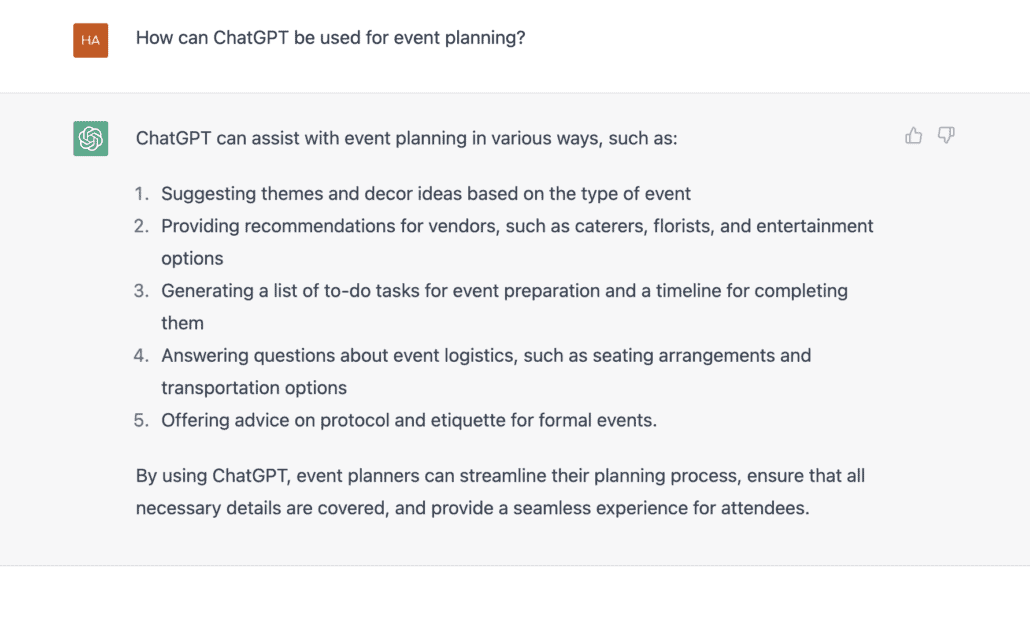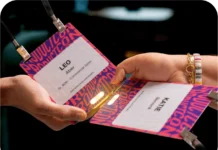 ChatGPT, the latest artificial intelligence chatbot, offers a lot of time- and labor-saving advantages for meeting and events professionals. But it’s not without issues.
ChatGPT, the latest artificial intelligence chatbot, offers a lot of time- and labor-saving advantages for meeting and events professionals. But it’s not without issues.
You’ve likely heard of ChatGPT, a natural language-process machine-learning chatbot that was launched free to the public to great fanfare last November by OpenAI. This next-gen chatbot promises to go where previous event chatbots — most of which are programmed to answer simple questions put into their databases as a sort of insta-FAQ for attendees wanting to know about restroom locations, schedule changes and dress codes — have not gone before. Namely it can create everything from personalized attendee communication campaigns, newsletters and social media posts, to post-con follow-ups and payment reminders. It also can help newbies to event planning get an idea of what their new job could entail. It can even provide a template for common communications, such as an email invite for the event.
What else can it do? We asked the chatbot:

But this new technology also could have a darker side. Many event organizers, fearing potential speakers and poster session submitters could use ChatGPT to generate their abstracts and possibly even papers and presentations, now are requiring speakers to swear that the work they submit represents original work not created with the help of AI. Mainly in response to similar worries about cheating expressed by teachers and professors, ChatGPT’s creator, OpenAI, in January launched a tool called the AI Text Classifier. Like ChatGPT itself, it’s not perfect, but the hope is that it can help sniff out whether the work of a student — or presenter — is original or AI-enabled. Other companies also are at work developing other AI-detection tools, so stay tuned.
Here are some of the other pros and cons of this new AI tech when it comes to events.
Pros of ChatGPT for Events
- Its algorithms can be used to analyze attendee data to help optimize marketing, including the best social media platforms to use for their target audience and the best times to post.
- It can take routine tasks off the planner’s plate, such as answering common questions, analyzing post-con evaluations to suggest areas for improvement, and help with scheduling and logistics.
- It can help with sourcing everything from a host facility to speakers to sponsors, though take heed of the below caveats before relying solely on ChatGPT for these. The more specific you can be in your requests, the better the chances you’ll get meaningful suggestions from the chatbot.
- It can provide decent promotional copy for attendee invitations, newsletters, sponsor requests, etc. Just be sure to use it as a template to start from, and customize it to your target audience.
Minuses of ChatGPT for Events
- It’s good, but not that good. The AI chatbot was trained on a vast quantity of digitized materials, from books and newspapers to online publications. While it’s often pretty accurate, it also can be wildly wrong at times, though it’s equally confident in what it provides either way — there’s no warning that a particular statement has an accuracy rating of 80%, for example. So, as is the case with your basic Google search, user beware, and always check for corroborating evidence that the ChatGPT “fact” is in fact factual.
- It’s already out of date. Though it launched just a few months ago, ChatGPT was trained in 2021, which means the data in its databanks is already a few years old.
- It’s only as good as the questions you ask it. The more general the question, the more likely it is that bad, or just very generic and not terribly useful, data could sneak in. The more specific you can make your request, the better the likelihood you’ll get something usable in return. So instead of asking for an invitation letter for an event, ask for an example of an invitation letter to a specific type of attendee for your specific conference’s topics of interest.
Remember that this new AI tool is still in beta, and it’s likely to improve with time (OpenAI on Feb. 1 released its first subscription plan, ChatGPT Plus, which offers additional benefits over the free beta version, for $20/month). Unless it doesn’t. There also is some concern that, if the chatbot’s responses to requests become an increasingly large portion of its database, its responses will become more focused on what it has already said, right or wrong, and less and less tethered to the reality that we humans inhabit.
Can ChatGPT as it exists today pass the Turing Test, developed by Alan Turing back in 1950, which is designed to determine if a machine can exhibit intelligent behavior equivalent to, or indistinguishable from, that of a human? Maybe, maybe not, but it is getting closer all the time.
You May Also Be Interested In…
Tech Tools We Can’t Live Without, Part 1
Tech Tools We Can’t Live Without, Part 2










